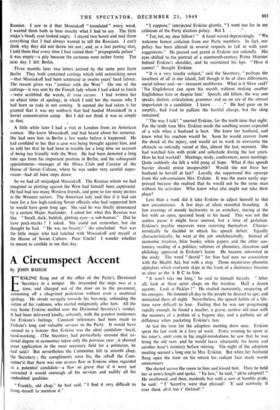A Circumspect Accent
By JOHN BAUGH
ERSKINE flung out of the office of the Party's Divisional Secretary in a temper. He descended the steps two at a time, and charged out of the door on to the pavement, cannoning off a chagrined pedestrian without even a muttered apology. He strode savagely towards his bus-stop, unheeding the victim of his rudeness, who started indignantly after him. All the way home Erskine mulled .over the Divisional Secretary's verdict. It had been delivered kindly, urbanely, with the greatest tenderness for Erskine's feelings. Constant references had been made to Erskine's long and valuable services to the Party. It would have seemed to a listener that Erskine was the ideal candidate—loyal, hard-working. (The Secretary had particularly stressed that ex- ternal degree in economics taken only the previous year ; it showed great application in the most necessary field for a politician, he had said.) But nevertheless the Committee felt (a smooth chap, the Secretary ; the compliments were his, the rebuff the Com- mittee's) that there was one serious flaw in Erskine when regarded as a potential candidate—a flaw so grave that if it were not corrected it would outweigh all his services and nullify all his undoubted qualities.
" Frankly, old chap," he had said, " I find it very difficult to bring myself to mention it."
"I suppose," interjected Erskine glumly, " I went too far in my criticism of the Party election policy. But I. . . ."
"Tut, tut, my dear fellow! " A hand waved deprecatingly. " We welcome honest criticism from our Party members. In fact, our policy has been altered in several respects to fall in with your suggestions." He paused and gazed at Erskine not unkindly. His eyes shifted to the portrait of a nineteenth-century Prime Minister behind Erskine's shoulder, and he moistened his lips. " Here it comes! " thought Erskine.
" It is a very touchy subject," said the Secretary, " perhaps the touchiest of all in our island, full though it be of class differences, social taboos and—er—innocent snobberies. What is it Shaw said? ' No Englishman can open his mouth without making another Englishman hate or despise him.' Speech, old fellow, the way one speaks, diction, articulation, grammar and so on are of the utmost importance in a candidate. I know. . . ." He had gone on to amplify, had tried to palliate the hurtful charge, but the sting remained.
"The way I talk! " snorted Erskine, for the tenth time that night. For the tenth time Mrs. Erskine made the soothing noises expected of a wife when a husband is hurt. She knew her husband, and knew what his reaction would be. Soon he would recover from the shock of the injury, and would set to work to overcome the obstacle so unkindly raised at this, almost the last, moment. She had watched him with pride and solicitude during the last years. How he had worked! Meetings, study, conferences, more meetings. Quite suddenly she felt a wild pang of hope. What if this speech barrier should prove insuperable? Would she not have her husband to herself at last? Loyally she suppressed this upsurge from the sub-conscious Mrs. Erskine. It was the more easily sup- pressed because she realised that he would not be the same man without his activities. Who knew what else might not take their place?
Less than a week did it take Erskine to adjust himself to this new circumstance. A few days of silent resentful brooding. A few evenings of moody taciturnity in an armchair, staring at the fire with an open, spurned book in his hand. This was not the useless pause it might have seemed, but a time of gestation. Erskine's psychic resources were renewing themselves. Charac- teristically he decided to attack his speech defect. Equally characteristically, he went at the job wholeheartedly. Instead of economic treatises, blue books, white papers and the other cus- tomary reading of a politico, volumes of phonetics, elocution and philology appeared in Erskine's home He became interested in the study. The word " dental " for him had now no association with the Health Act, but with a stop. Those mysterious phonetic alphabets which everyone skips at the front of a dictionary became as clear as the A B C to him.
" It won't take me long," he said to himself fiercely. " After all, look at these actor chaps on the wireless. Half a dozen accents. Look at Pickles !" He studied incessantly, unsparing of his energies. He listened all day to the people he desired to ape, and mimicked them all night. Nevertheless, the speech habits of a life- time were difficult to lose. Feeling that he was not progressing rapidly enough, he found a teacher, a grave, austere old man with the manners of a prelate of a bygone day, and a pathetic air of diffidence when pocketing Erskine's fees
At last the time for the adoption meeting drew near. Erskine spent the last week in a fury of work. Every evening he spent at his tutor's, until even in his single-mindedness he saw that he was tiring the old man. and he would leave reluctantly for home and another hour's mimicry before retiring. The night of the adoption meeting seemed a long one to Mrs Erskine. But when her husband flung open the door on his return his radiant face made words unnecessary She darted across the room to him and kissed him. Then he held her at arm's length and spoke. " Ee lass," he said, " ah'm adopted! " He swallowed, and then, modestly but with a sort of humble pride, he said: "T' Secret'ry were that pleased! 'E said nobbudy 'd ever think ah'd bin t' Oxford! "


































 Previous page
Previous page